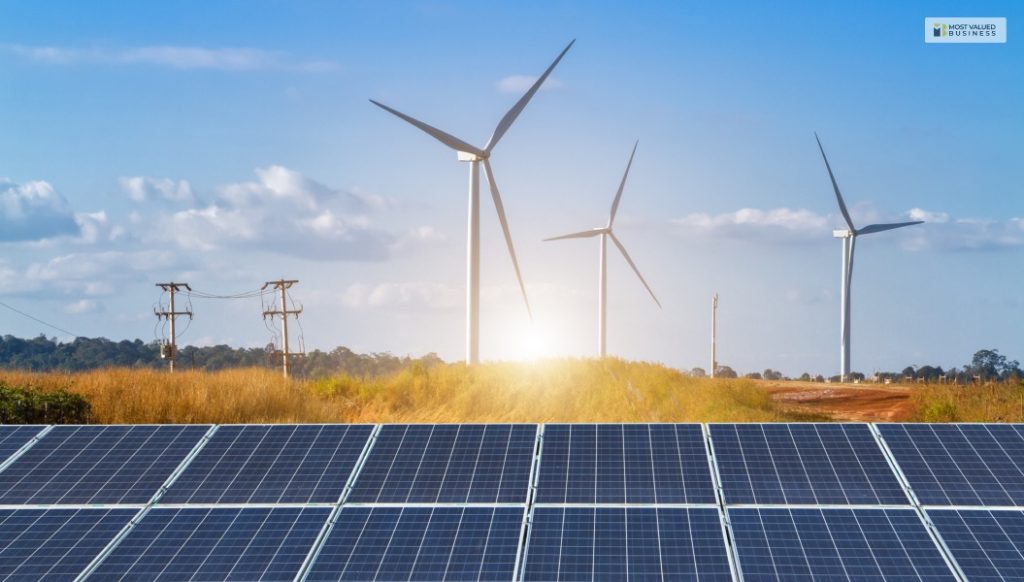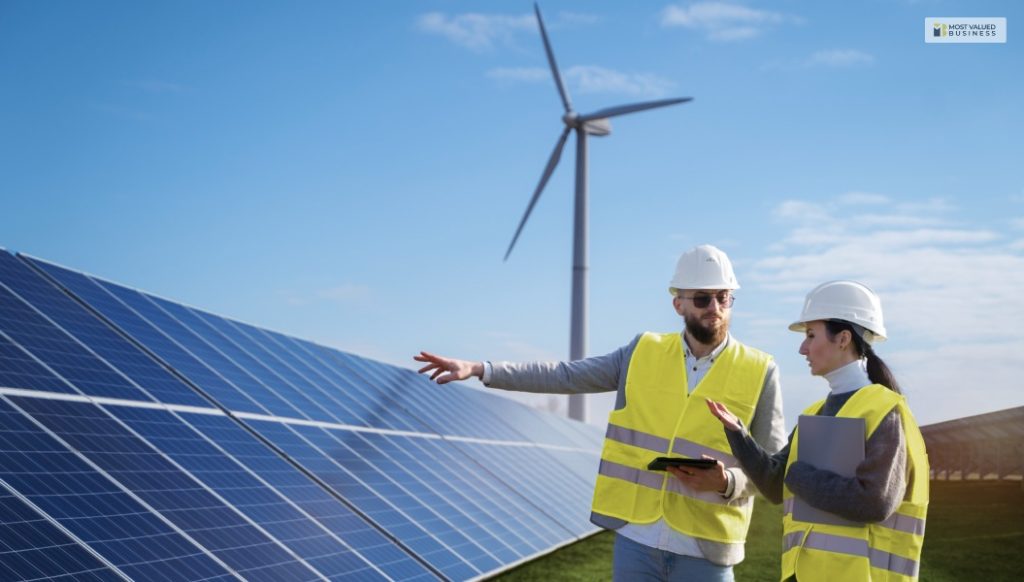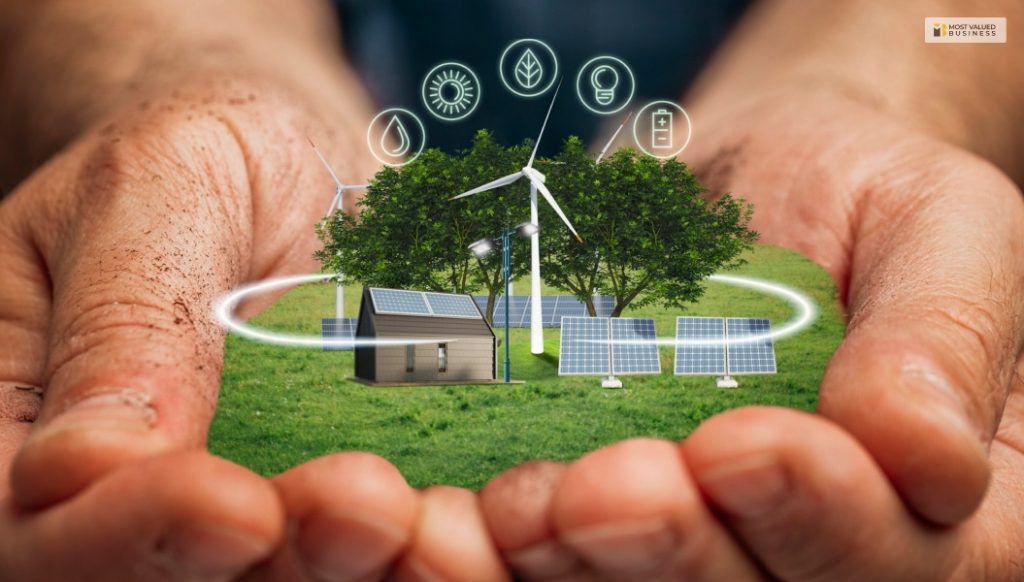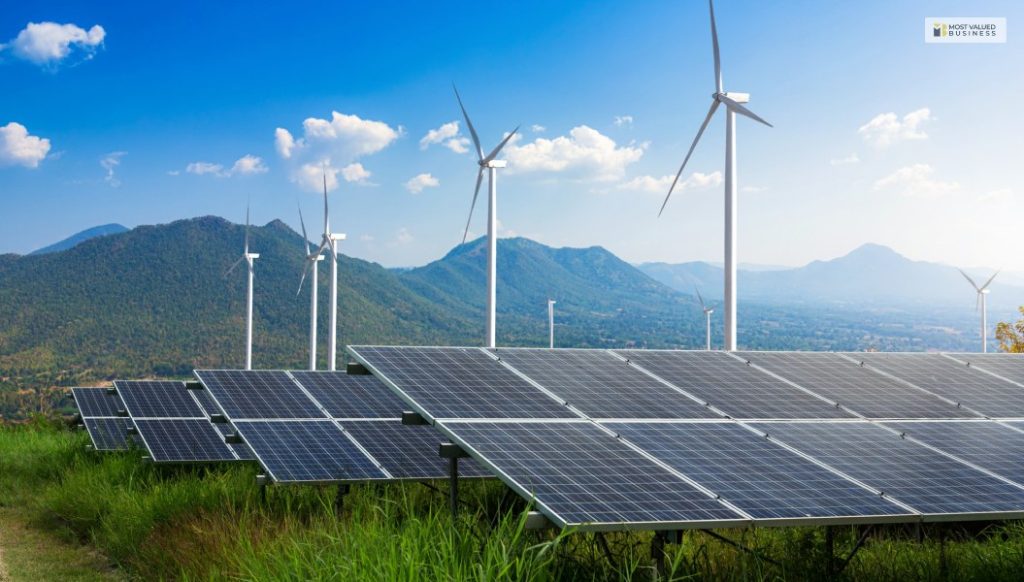What Is Renewable Energy? – Importance, Working, Types, And More
Renewable Energy includes those sources of energy that are free from depletion and are naturally available. Some of the major examples of renewable energy are solar power, wind power, and hydropower. Nowadays, many small and big businesses are utilizing the benefits of renewable energy sources and contributing towards the rise of the green revolution.
In this article, you will learn about renewable energy in general and the development and working of renewable energy sources. In addition, this article discusses the major types of sources of renewable energy. Furthermore, you will also learn the importance of renewable energy and how businesses can make the most of them. Finally, this article shares the major pros and cons of renewable energy.
What Is Renewable Energy?

According to the US Department of Energy,
“Renewable Energy comes from unlimited, naturally replenished resources, such as the sun, tides, and wind. Renewable energy can be used for electricity generation, space and water heating and cooling, and transportation. Non-renewable energy, in contrast, comes from finite sources, such as coal, natural gas, and oil.”
Basically, renewable energy comes from natural energy sources. The best part is that you can constantly replenish the energy. This is because the sources of these energies are constant. For example, solar energy from the sun and wind energy from the blowing of wind are good examples of renewable sources of energy.
Development And Working Of Renewable Energy

An article on NRDC adds –
“Now that we have innovative and less-expensive ways to capture and retain wind and solar energy, renewables are becoming a more important power source, accounting for more than 12 percent of U.S. energy generation. The expansion in renewables is also happening at scales large and small, from giant offshore wind farms to rooftop solar panels on homes, which can sell power back to the grid.”
Although renewable sources of energy are the solution for the future, humans have been harnessing these energies for many centuries. However, as humans have become more dependent on fossil fuels in the last few centuries, the use of renewable energy has decreased.
There is a global drive towards Net Zero emissions, and there are various advancements in the capture and storage of renewable energy. As a result, there has been an expansion of the production of renewable energy solutions. The development of renewable energy solutions ranges from the placement of solar panels above a home to the installation of large-scale wind energy facilities for wind farms.
The importance of these renewable sources of energy lies in their potential to provide constant access to power without the use of natural resources. With proper management and diversification of sources, renewable energy can meet the energy needs of humans in the future.
What Are The Major Types Of Renewable Energy Sources?

According to the United Nations,
“Renewable energy is energy derived from natural sources that are replenished at a higher rate than they are consumed. Sunlight and wind, for example, are such sources that are constantly being replenished. Renewable energy sources are plentiful and all around us. […] Generating renewable energy creates far lower emissions than burning fossil fuels.”
The following are some of the major types of renewable sources of energy:
1. Solar Energy
One can generate solar energy with the help of PV cells. These cells are made of silicon and other materials and help transform sunlight directly into electricity. This is one of the best forms of renewable sources of energy. Nowadays, businesses and homes are making the most of solar energy.
Although solar energy can generate enough power for thousands of homes, it still depends on the weather conditions. However, with recent developments in the field of solar energy, the use of solar panels and solutions is increasing day by day.
2. Wind Energy
Wind energy is one of the oldest renewable sources of energy known to humankind. These days, wind turbines are as long as skyscrapers. Hence, wind energy turns the blade of the turbine, which further feeds into an electric generator. This further helps in producing electricity.
Today, almost 10% of the electricity generation in the United States comes from wind energy. Also, wind energy is one of the cheapest forms of energy. It is evident that in the coming years, the implementation of wind energy will grow to a much broader extent.
3. Hydroelectric Power
One of the largest renewable sources of electricity is hydroelectric power. However, wind energy will soon take over. Generally, hydropower relies on fast-moving water and converts the force of that water into electricity. They do it by spinning the turbine blades of a generator with the force of the water.
Although hydroelectric powers are non-renewable sources of energy, if properly managed, they can lower the damage to the environment.
4. Geothermal Energy
The most common example of geothermal energy is a hot spring. This energy comes from drilling deep wells, which in turn bring out underground water to the surface of the earth. This happens because of the effect of the core of the earth.
Typically, geothermal plants emit low carbon if they pump the water and steam they use back in the water reservoir. However, there are concerns that too much geothermal energy can lead to a rising risk of earthquakes.
5. Biomass Energy
Biomass energy is derivable from the material that comes from plants and animal bodies. These also include crops, trees, waste wood, etc. Once you burn biomass, there is a release of chemical energy in the form of heat. This heat helps to generate electricity in a steam turbine.
Although they are a form of renewable energy, some forms of biomass energy can produce higher emissions of carbon than even fossil fuels. However, under certain circumstances, biomass energy serves as a low-carbon option.
Importance Of Renewable Energy For Business

Investopedia adds –
“From photovoltaic solar panels to kinetic energy adapters that generate electricity from pedaling stationary bicycles, entrepreneurs are taking advantage of the green revolution by finding and marketing renewable energy solutions. Since we use energy for almost everything, the recent trend towards greener, more sustainable technology is creating many opportunities for entrepreneurial-minded individuals.”
With time, renewable energy sources are becoming popular among businesses. This is because they hold a variety of importance that benefit businesses in the long run. Here are some of the major importance of renewable energy for businesses:
1. Better Brand Image
Since consumers are more aware of sustainable practices, they are likely to invest in the products and services of those businesses that are more conscious about the environment. Hence, the implementation of renewable energy can help to generate a better brand image.
2. Regulatory Compliance
As the importance of sustainable environmental practices increases, governments are coming up with stricter environmental regulations. Hence, by starting to implement renewable energy sources, businesses can ensure better compliance with regulations.
3. Securing Future Sustainability
One of the major focuses of environmental sustainability is to have a future with a lower carbon footprint. Hence, businesses are relying less on conventional sources of energy. At the same time, these businesses are actually future-proofing themselves to have better access to sustainable sources of energy. Furthermore, businesses can also save more costs on
4. More Focus On Innovation
As businesses are embracing renewable energy, they are able to focus on sustainability and innovation and position themselves as leaders. As a result, businesses get a competitive advantage in the market. Hence, they get better access to investors, talent, and customers who want to contribute to environmental sustainability.
What Is The Future Of Renewable Energy?

According to a report from the International Energy Agency, the capacity of renewable energy is set to expand a lot in the coming years. Apart from that, in other reports, the IEA also stated that the energy crises in the last couple of years led to the stimulation and usage of solar and wind energy. Hence, there is a lot of chance that renewable energy sources will grow in the next few years. Furthermore, there will be a fall in the prices of clean energy, too.
“Renewable energy sources are omnipresent. They can be harnessed easily by using appropriate technology. It is imperative to deploy renewable energy resources and enhance green energy generation capacity to tackle climate change and meet net zero emissions. Green energy is not only eco-friendly but also affordable and generates employment. It will revolutionize sustainable energy systems.”
The following are some of the major trends that will drive the growth of renewable energy in the future:
1. Sources like solar energy and wind energy solutions are on the verge of expansion. Furthermore, decreasing costs are adding to this expansion by making renewable energy competitive with conventional sources of energy.
2. As the demand for sustainability increases, businesses are facing pressure from stakeholders to ensure sustainable practices. They are also focusing on reducing their carbon footprint in the long run.
3. Many governments are coming up with regulations and incentives to encourage sustainable practices in businesses. Some examples of such steps include providing subsidies and tax breaks. Furthermore, governments are also focusing on making stricter environmental regulations.
4. Businesses are also investing heavily in technology that helps accelerate sustainable practices and renewable energies. Also, innovations in ocean energy and geothermal energy are helping diversify renewable sources of energy.
Benefits Of Renewable Energy For Businesses In The Future
As the use of renewable energy increases with time, businesses also benefit a lot. As businesses are transitioning from conventional sources of energy to renewable energy, they will benefit from the following:
- Businesses will be able to save on energy costs in the long run.
- As businesses invest more in sustainable practices, they can benefit from a better brand reputation. Furthermore, it also adds to higher customer loyalty.
- By investing in renewable energy and sustainable practices, businesses are also maintaining compliance with changing environmental regulations.
- Businesses are also able to attract and retain more talent (individuals) who know the importance and value of sustainability.
Read More: Most Profitable Business Of 2024: Here Is Where You Should Invest In
Major Pros And Cons Of Renewable Energy
According to HSBC Business Go,
“While all energy sources have pros and cons, businesses should consider which is better for sustainable development. Renewable resources may require a significant amount of fossil fuel for manufacturing and installation have multiple long-term advantages. They add less atmospheric pollutants, lower bills, provide investment return, and are a ‘green’ source of energy.”
The following are some of the major pros and cons of renewable energy that you need to learn if you want to implement sustainable practices in your business:
Pros
Here are some of the major pros of renewable energy that you will benefit from:
- It provides a source of generating freely available energy.
- All forms of renewable energy count as clean and green energy.
- As the use of renewable energy grows, there has been a surge in the number of jobs related to the development and installation of solutions.
- Such energy sources help in reducing electricity bills.
Cons
Here are a few cons of renewable energy that you need to be aware of:
- These forms of energy are not stable sources of power generation, as they are more reliant on weather conditions. Hence, many experts prefer Nuclear energy, which emits low levels of carbon dioxide in the atmosphere.
- Due to the variable production capacity of renewable energy, there is a requirement for large energy solutions to ensure the flow of power at all times.
- However, even if you deploy multiple sources of renewable energy to ensure flexible power generation, it will get really costly for you.
- Some renewable energy sources do not have any problems with supply. However, they come with their own challenges and environmental impact.
Summing Up
Hope this article was helpful for you in getting a better idea of what renewable energy is and how it can fulfill the needs of humans in the future. Furthermore, businesses are also taking renewable energy seriously as they are preparing for energy security in the future. What is your opinion on the role of renewable energy in the future? Consider sharing your ideas and opinions in the comments section below.
For More Business Related Information Click Below!!



